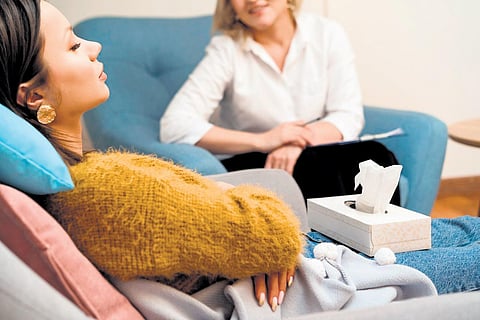

Hypnosis often gets bad press. Or is seen as a bit of a con. In spite of its pop culture reputation of putting people to sleep with a magic word or gesture, hypnosis does have the potential in reducing sleep anxiety. Given that there’s a 57 per cent increase in Indians staying up late, according to Wakefit.co’s fifth edition
of its Great Indian Sleep Scorecard 2022 survey, it’s a venue worth examining.
“There are four stages of sleep—stage one is when you transition from wakefulness to sleep, stage two is light sleep, stage three is slow-wave sleep or deep sleep, and stage four is the deepest level of sleep, also called (rapid eye movement) REM sleep.
It’s the third stage that hypnosis works on deepening, as this crucial stage in the cycle comprises low-frequency brain waves that last between 70 and 90 minutes, which, as you age, declines,” says Gurugram-based somnologist Rajeev Sharma.
Hypnosis to your aid
It is a state of consciousness in which a person is focused intensely on a particular idea or image. This reduces their peripheral awareness and fosters what can appear to be a trance-like state, according to Sleep Foundation. Through in-person suggestions or audio assistance, hypnosis increases delta waves in the brain that are associated with deep sleep stages.
“The slow oscillations of stages three and four are characterised by delta waves that play a protective and restorative role at the cellular level, enhancing one’s capacity to process information and respond to it as well as facilitate memory consolidation,” says Sharma. According to a 2022 study by the journal Communications Biology, the hypnotic process increases the secretion of beneficial sleep-promoting hormones such as melatonin, cortisol, leptin and ghrelin, and reduces sympathetic dominance, an imbalance of the nervous system where fight, flight or freeze responses (a physiological reaction to a perceived threat to survival) become heightened,” says Delhi-based psychotherapist Anju Goel.
The goal of hypnotherapy, contrary to what people think, is not to make you fall asleep in an instant. The hypnotherapist’s job is to lower the frequency of thoughts, especially the negative ones, and let you slip into restfulness. Many times it is performed in association with cognitive behavioural therapy, which looks at psychological problems that may be keeping you awake.
Help thy self
While hypnotherapy involves several calculated steps, visualisation, or the practice of imagining what you want to achieve in the future, is a big part of it. The only difference is that the nature of the therapeutic suggestions (inputs given to induce a hypnotic state) are sleep-focused.
Even though best undertaken under professional guidance, self-hypnosis is effective in many cases. Listening to binaural beats (auditory waves that occur when you hear sounds at different frequencies) are especially helpful as they increase delta waves, which help one enter deeper stages of sleep.
“Equally important is choosing a recording targeted to your sleep issue. What is it that you’re trying to address—insomnia, sleep apnea, sleep-walking, excessive daytime sleepiness, restless legs syndrome, sleep terrors or snoring? The method of narration of a recording matters as much. The Ericksonian model, a style of hypnotherapy taught by psychiatrist Milton Erickson, uses indirect suggestion in the way of metaphors, subtle hits and storytelling to alter behaviour, rather than direct ones. It is more beneficial than traditional ones,” says Mumbai-based hypnotherapist Nupur Singh. To make the process more effective, exercise every day, avoid alcohol or caffeine post 7 pm, eat a light dinner and take
a warm bath before bed.
Having said that, sleep issues are layered and if you’ve been experiencing difficulties since long, consult a doctor to see if there’s something else you might need along with alternative treatments such as hypnotherapy. Be open to getting to the root cause because disturbed sleep could be the result of a deeper issue. Sleep on that.